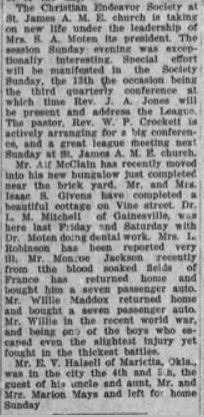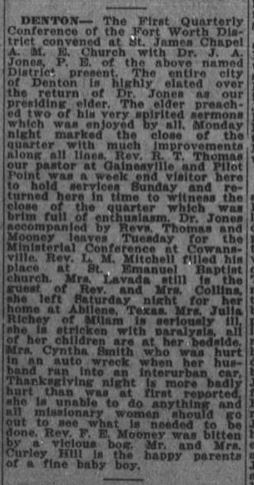St. James AME Church
ST. JAMES AFRICAN METHODIST EPISCOPAL CHURCH. St James African Methodist Episcopal (AME) Church was organized in 1875, in Freedmen Town, a former African American Community on the perimeter of Denton, Texas. By the 1880s, Freedmen Town became know as Quakertown, which developed into a thriving black-middle class neighborhood by the 1920s, before it’s dissolvement.
St. James AME is the oldest recorded African American church in the city of Denton. The congregation was formed by freedmen and women from White Rock, located in Dallas county who fled outside the city of Denton. Rev. L.T. Lambert became the first pastor of St. James AME. Before St. James AME constructed its first church building before the early 1890s, the congregation held church services at church members’ homes. By the early 1890s, St. James relocated to Oak Street and built a church there under the leadership of Rev. D. Hill. Then in 1899, the church was rebuilt under the leadership of Rev. J.S. Powe. In 1909, another building was erected on the property of St. James AME. This location on Oak Street severed the church until 1922.
The leaders of the African American community were often preachers, and sometimes doctors, teachers or, lawyers, but the church often served as a platform for the leaders to get their message across to other community members. St. James AME was essentially the backbone of the African American community and prominent African Americans of Denton served in leadership roles of the congregation. For instance, Dr. Moten, an African American doctor served as president of the Christian Endeavor, which was St. James AME’s own unique organization. In addition, Moton was a major representative of St. James AME, which hosted the Dallas District Sunday school convention, in 1920. At the time, Rev. Jones was one of the primary preachers of St. James AME, who also attended the conference with Moten along with delgelates across North Texas. At that same conference, a preacher from Bonham delivered a speech arguing that “the preacher should be the most intelligent person in the community, not only in his subjects, but on all familiar and kindred subjects to be a complete leader.”
By the 1920s, with the removal of Quakertown on the horizon, strong leadership from St. James AME would be essential for the difficult times that lied ahead for the African American community. The campaign for Quakertown’s removal, led by white city officials and leaders was in full force by the early 1920s. After Texas Woman’s University (TWU), formally known as College of Industrial Arts (CIA) opened their doors in 1903, white Dentonites and state officials became increasingly concerned with the proximity of the white women’s college to the black community of Quakertown. To solve this problem, leading white organizations and leaders in Denton passed a park bond that officially ordered Quakertown residents to sell their property to the city to construct a park. Many Quakertown residents relocated to Solman Hill, in the southeastern portion of Denton, where the current church of St. James AME is located on Oak Street.
Before and after the removal from Quakertown, St. James AME was very active in the Denton African American community. According to numerous reports from the Dallas Express, St. James AME was presumably one of the most active African American churches in Denton County during the late nineteenth and early twentieth centuries. St. James AME often interacted with several African American congregations in Denton, including, Pleasant Grove Baptist, St. Emmanuel Missionary Baptist, and Mt. Pilgrim CME. Furthermore, they hosted graduation ceremonies for the African American schools in the area and hosted church-related rallies to benefit the community. For instance, in 1919, St. James AME was scheduled to host a graduation ceremony. Again, in 1922, St. James AME hosted a graduation, but specifically for Fred Moore School. County Line Baptist Church in Pilot Point also hosted graduations for the local African American youth, since churches often served as a community centers, not just for church worship services. In Denton County, during the late nineteenth and early twentieth centuries, church served also served as a common communal area to host community events, which was also common in the South.
Upon the 110th anniversary since the founding of St. James AME, the church received its historical marker in 1985. As of 2018, St. James is reaching it’s 143rd anniversary, remains the third-oldest African American church in Texas.
Citations: Willie Frances McAdams “St. James African Methodist Episcopal Church,” Texas Historical Commission (THC) Subject Application, 1985. https://apps.dentoncounty.com/website/HistoricalMarkers/PDFs/St-James-African-American-Methodist-Episcopal-Denton.pdf;McAdams “St. James African Methodist Episcopal Church,”(THC) Subject Application, 1985. https://apps.dentoncounty.com/website/HistoricalMarkers/PDFs/St-James-African-American-Methodist-Episcopal-Denton.pdf;Chelsea Stallings, “Removing the Danger in a Business Way: The History and Memory of Quakertown, Denton, Texas,” (maters thesis University of North Texas, 2015), 21; The Dallas Express (Dallas, Tex.), Vol. 27, No. 49, Ed. 1 Saturday, September 11, 1920, newspaper, September 11, 1920; Dallas, Texas. (texashistory.unt.edu/ark:/67531/metapth278318/m1/4/?q=%20denton: University of North Texas Libraries, The Portal to Texas History, texashistory.unt.edu;Stallings, “Removing the Danger in a Business Way: The History and Memory of Quakertown, Denton, Texas,” 2015, 3; McAdams “St. James African Methodist Episcopal Church,”(THC) Subject Application, 1985. https://apps.dentoncounty.com/website/HistoricalMarkers/PDFs/St-James-African-American-Methodist-Episcopal-Denton.pdf The Dallas Express (Dallas, Tex.), Vol. 26, No. 16, Ed. 1 Saturday, February 1, 1919, newspaper, February 1, 1919; Dallas, Texas. (texashistory.unt.edu/ark:/67531/metapth278246/m1/2/?q=denton%20church: accessed May 2, 2018), University of North Texas Libraries, The Portal to Texas History, texashistory.unt.edu; The Dallas Express (Dallas, Tex.), Vol. 29, No. 31, Ed. 1 Saturday, May 20, 1922, newspaper, May 20, 1922; Dallas, Texas. (texashistory.unt.edu/ark:/67531/metapth278392/m1/5/?q=+denton: accessed May 2, 2018), University of North Texas Libraries, The Portal to Texas History, texashistory.unt.edu; McAdams “St. James African Methodist Episcopal Church,”(THC) Subject Application, 1985. https://apps.dentoncounty.com/website/HistoricalMarkers/PDFs/St-James-African-American-Methodist-Episcopal-Denton.pdf





